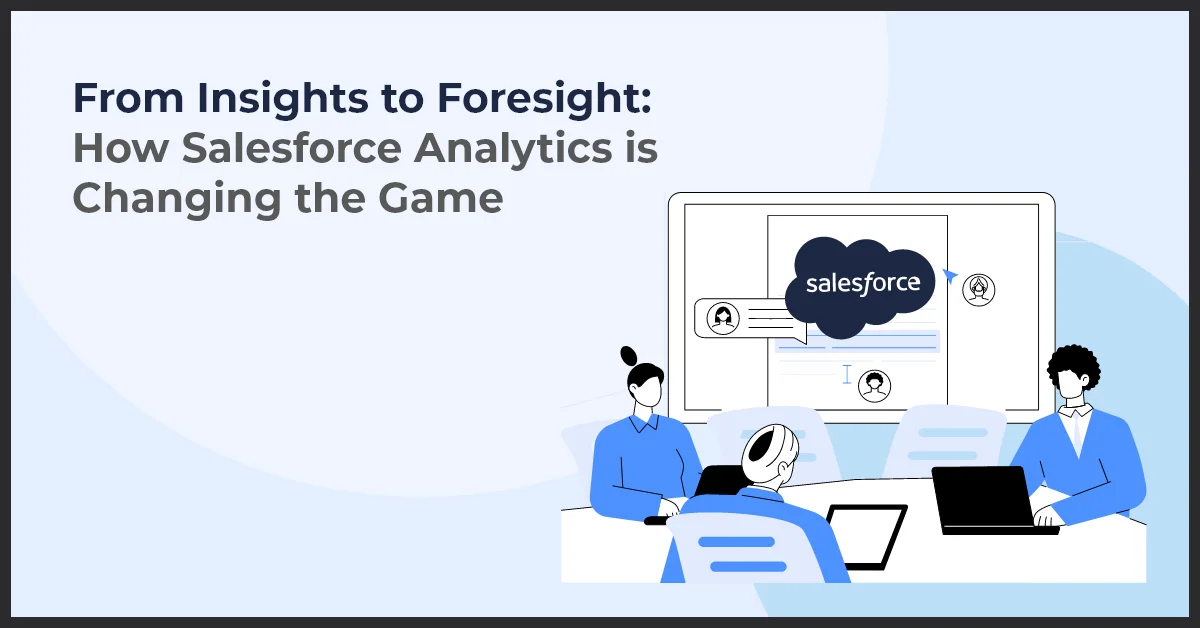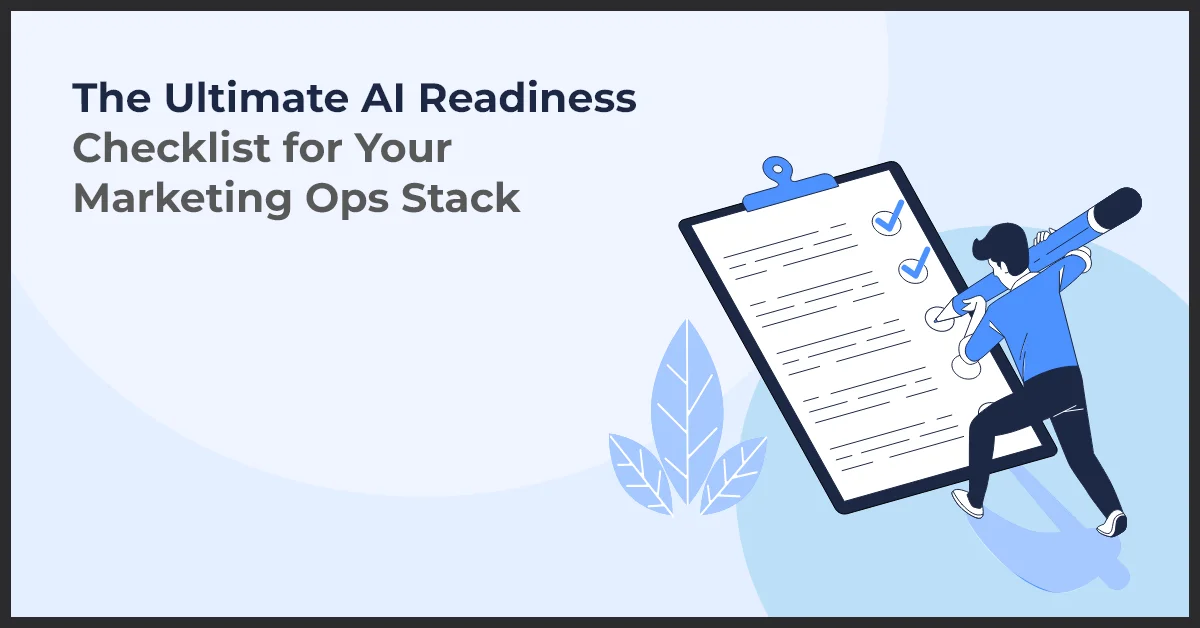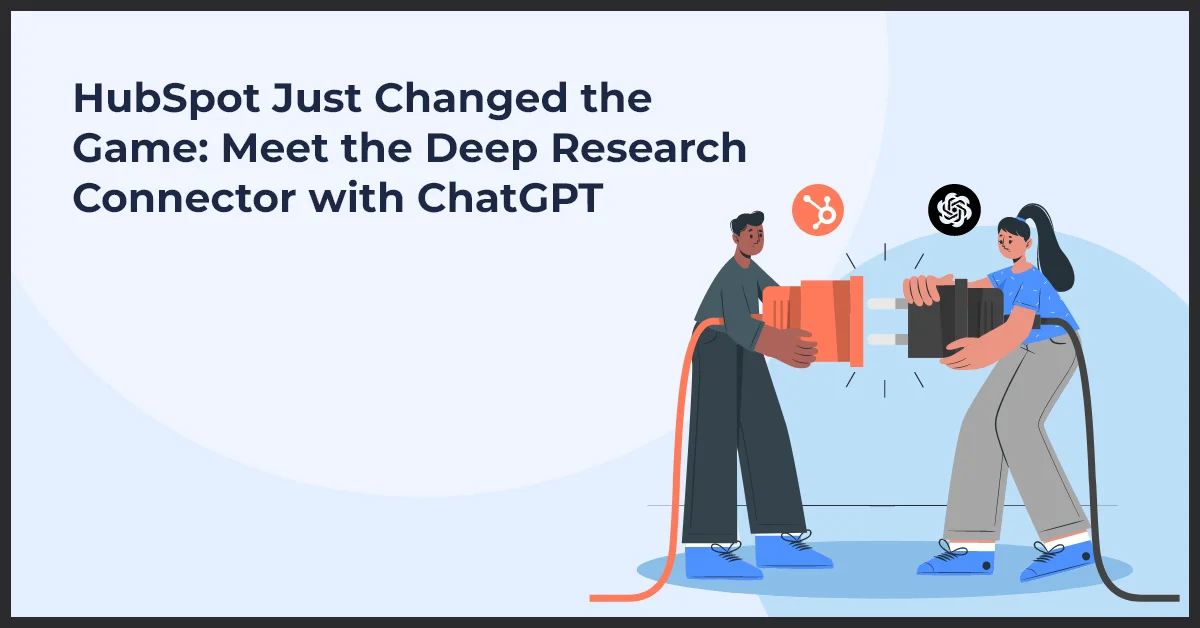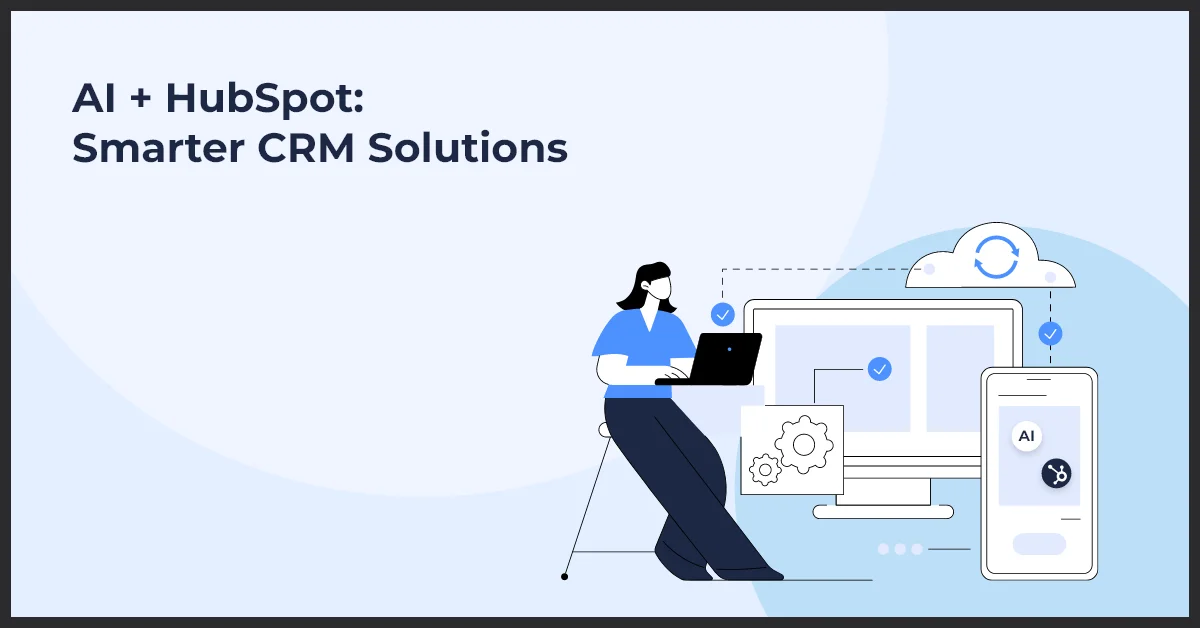From Insights to Foresight: How Salesforce Analytics is Changing the Game

Published on: July 11, 2024
Updated on: October 18, 2024
1452 Views
- Thought Leadership
7 min read
Is your Salesforce dashboard ready to pick signals from the future? If not yet, be ready. We are accelerating toward the new era of Salesforce AI-powered analytics and it's happening faster than you can imagine.
The future of Salesforce analytics is all about translating guesswork into greatness. From uncovering hidden patterns to delivering spot-on predictions, it's on a mission to power up your business like never before.
Salesforce now allows you to uncover what you can't see, predict what's yet to come, and make decisions that are future-ready.
In this blog post, we will take a glimpse of the future of Salesforce Analytics. Let's explore how it opens up the full potential of your data and makes your business grow faster.
The Critical Role of Analytics in the Age of Emerging Technologies
Data is the all-time guide for any business, gathering information about the market and their customers. But, what's it useful for when you can't extract the insights from it?
Analytics gives you the power to process large data sets and extract insights from the collected information. As technology has evolved a lot, so does the world of analytics. Technologies such as AI, machine learning (ML), natural learning processing (NLP), and many more have transformed the way businesses access insights. Bridging the gap between tech and insights, analytics help you:
- Uncover hidden market patterns, trends, and customer preferences.
- Predict future trends and customer behavior.
- Get real-time insights and optimize operational efficiency.
- Make informed decisions based on insights backed with AI, ML, and NLP capabilities.
Fresh and New Features in Salesforce Analytics Cloud
Salesforce is known for pushing its boundaries and experimenting with its features and advancements. Let’s take a closer look at its recently added features in Analytics Cloud that make it the industry leader:
- Einstein Wave Apps: Pre-Built Insights at Your Fingertips
Marketers no longer have to go through painful data setups or complex analysis configurations. Einstein Wave Apps by Salesforce is a set of AI-driven prebuilt, industry-specific dashboards and reports. Now it’s easy to get out-of-the-box insights into your sales pipeline, marketing campaigns, or customer service metrics – all with your industry-specific spin. Wave Apps are designed for businesses to enjoy ready-made solutions without needing extensive customization.
- Natural Language Query (NLQ): Ask Questions, Get Answers
Salesforce is using NLQ to help democratize data analysis. Now, ditch those complex queries and talk to your analytics solution just like a friend. Merely ask simple questions like 'What are the top drivers of customer churn?’ or ‘Show me trends by region in sales.’ Whether you have technical expertise or not – simply ask questions and get answers.
- Embedded Analytics: Insights Flow Seamlessly Within Workflows
Salesforce is busting data silos with Embedded Analytics. Instead of having to switch between apps, you can get key insights and sales pipeline analytics embedded in the Sales Cloud interface. Similarly, Service Cloud agents can get insights embedded right in the console to personalize customer interactions based on real-time data.
- Einstein Discovery: Uncover Hidden Gems in Your Data
Einstein Discovery is the real game changer in Salesforce analytics, which is effectively a virtual data scientist. It automatically analyses massive datasets and finds new patterns that would have gone unnoticed by mere human analysis. For example, you can use Einstein Discovery to identify new customer segments, sales trends, or churn risks automatically. Einstein Discovery empowers businesses to unearth valuable insights and make decisions they might not have even considered before.
- Customer 360 Data Manager: Get a Unified Customer View
Salesforce’s Customer 360 Data Manager is an analytics hub that unifies your customer data into a single view. It includes information sourced from marketing automation systems, social media, loyalty programs, and more. Now you have the ability to have a single view of 360 degrees of the customer. This empowers you to personalize marketing, anticipate customer needs, and improve the overall customer experience.
Salesforce’s Journey of Strengthening its Analytics Ecosystem Through Acquisitions and Mergers
Apart from establishing itself as a strong data analytics platform, Salesforce Analytics continues to innovate and expand its capabilities. Strategic acquisitions and mergers with other software helped it create an ecosystem to meet evolving business needs.
Let’s explore some of the notable merges of Salesforce analytics that make it truly commendable:
- Tableau (2019): This acquisition significantly boosted Salesforce’s data visualization capabilities. Tableau’s intuitive interface and advanced visualization options have made data insights more accessible and actionable for businesses.
- MuleSoft (2018): By acquiring MuleSoft, Salesforce enhanced its ability to integrate data from various sources seamlessly. MuleSoft’s Anypoint Platform allows businesses to connect silos data systems. It ensures a unified and comprehensive view of their data, which is crucial for effective analytics.
- Einstein Analytics (2014): Formerly known as Waves Analytics, Einstein Analytics brings AI and machine learning to the forefront of Salesforce’s analytics offerings. This integration allows businesses to leverage predictive analytics and automate insights, enabling smarter decision-making based on real-time data.
- ClickSoftware (2019): This acquisition improved Salesforce’s field service management capabilities. It incorporates ClickSoftware’s advanced scheduling and optimization tools. Salesforce can now provide more accurate and efficient field service operations, backed by robust analytics.
- Datorama (2018): Datorama’s acquisition helped Salesforce unify marketing data from various channels into a single platform. This allows businesses to analyze and visualize their marketing performance comprehensively. It helps with better strategic decisions and optimized marketing efforts.
What’s Next for Salesforce Analytics?
What makes Salesforce Analytics one of the best tools is its continuous advancements and improvements. We can assume its future is full of capabilities that will open new doors of opportunities for businesses. Let’s have a glimpse at what we can expect from Salesforce analytics in the coming years:
- Deeper Integration of AI and Machine Learning
In the future, we can expect analytics to go beyond identifying patterns and recommend strategies to retain at-risk customers. Explainable AI (XAI) will ensure that AI decision processes are transparent and accessible, building trust. Salesforce will prioritize the responsible use of AI, with early commitments to reduce bias and ensure fairness in data analytics.
- Democratization of Analytics for All Users
Natural language interaction (NLI) will offer a more natural form of human interaction with data. Low-code/no-code tools will help businesses access data without needing advanced technical expertise. It will help marketers of all levels to contribute to informed decision-making.
- Rise of Customer Data Privacy and Security
In order to comply with GDPR and CCPA, Salesforce will invest in privacy-enhancing technologies (PETs) to guarantee privacy. It will help businesses in data consent management and ensure data governance compliance. Salesforce will help businesses foster greater trust with their customers.
- Focus on Customer Journey Orchestration
Real-time data processing will allow you to personalize interactions with every customer. Enhanced customer data platform (CDP) capabilities will allow you to centralize your customer data for a single customer view. It will help you to manage customer journeys across the touchpoints in real time.
- Industry-Specific Solutions
Salesforce will offer industry-specific analytics. This will offer prebuilt dashboards and reports specific to certain industries, such as healthcare, finance, retail, and others. It will help industries set tailored KPIs and address their unique challenges efficiently.
Conclusion
With its future-ready capabilities like AI, ML, and NLP, the coming years with Salesforce analytics is all geared up to be lucrative for businesses of all kinds. These technologies and advancements can transform the way you analyze your data and extract insights from it. Salesforce analytics can help you uncover insights that were once beyond our expectations. If you aren’t leveraging its capabilities already, now is the time. Analyze, explore, and make your analytics game future-ready! Ready to Unlock the Future of Business Analytics? Let’s Talk!
The experts at Growth Natives would love to pitch in. Drop us an email at info@growthnatives.com and we will take it from there.
Frequently Asked Questions
Salesforce Analytics refers to the suite of tools and technologies provided by Salesforce that enable organizations to analyze their data, derive insights, and make data-driven decisions.
Salesforce Analytics integrates directly with Salesforce CRM data, providing deeper insights into customer behavior, sales trends, and operational metrics that are crucial for businesses.
Salesforce Analytics offers benefits such as improved decision-making through real-time insights, enhanced customer understanding, predictive analytics capabilities, and streamlined reporting.
Salesforce Analytics enables marketers to analyze campaign performance, segment audiences based on behavior and demographics, personalize marketing messages, and optimize marketing spend.
Experts predict advancements in AI-driven analytics, expanded capabilities for IoT and big data integration, and increased emphasis on real-time, actionable insights to drive competitive advantage.



